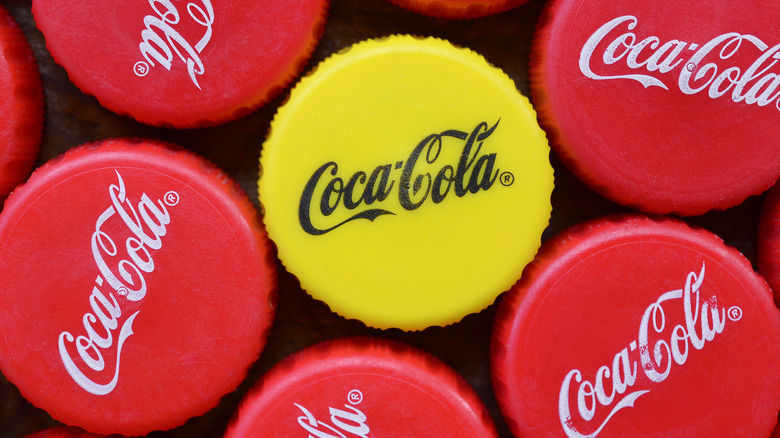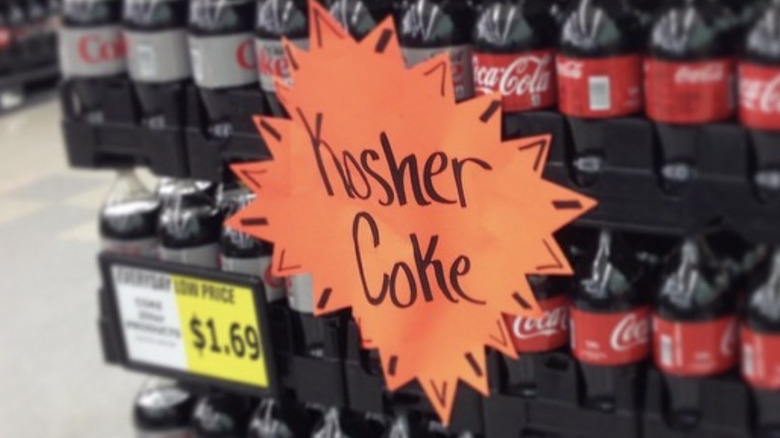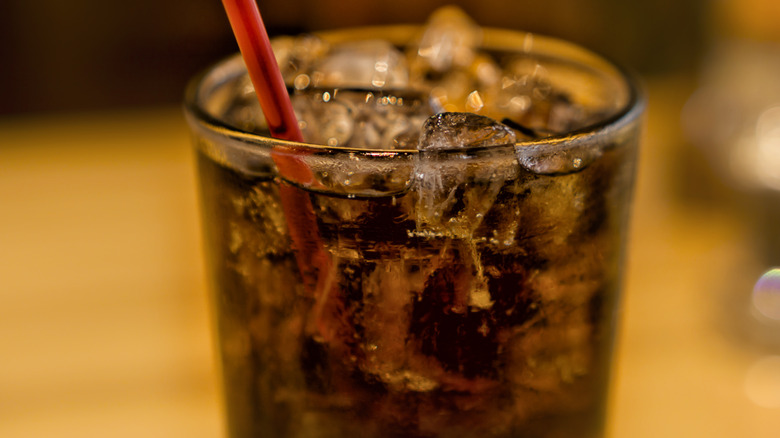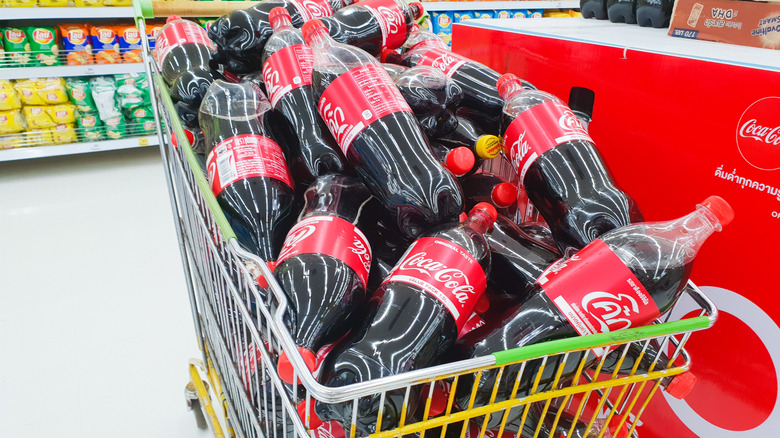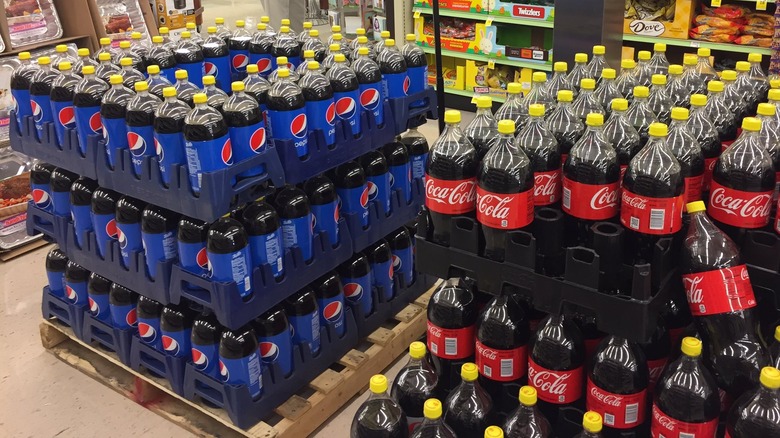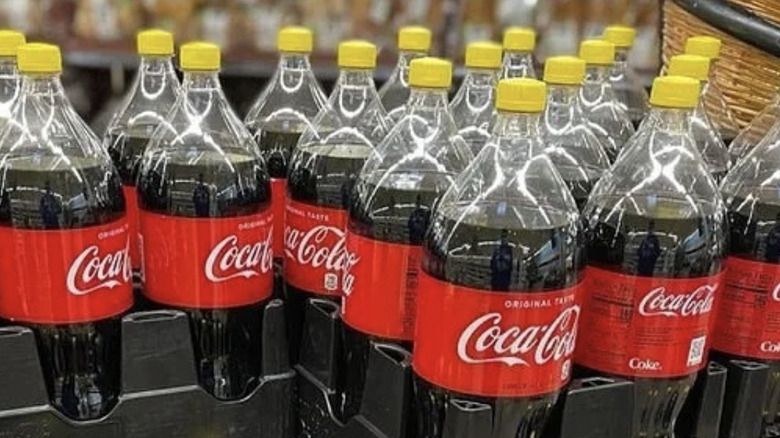Kosher Coca-Cola: 6 Facts About The Drink
Consumed in almost every corner of the world by people from numerous walks of life and for well over a century, it's almost an objective truth that, as the ad campaign once said, Coke is it. Coca-Cola, that one-of-a-kind blend of cola nut and other smooth flavorings combined with a wallop of sweetener and nose-tingling fizz, is one of the most popular soft drinks of all time. It pretty much launched the idea of soda consumption in both bottles and at fountains in the late 1800s.
That unmistakable Coca-Cola formula — often imitated but never totally recreated by the likes of Pepsi, R.C., or Shasta — is tried and true, while also changing ever so slightly over the years. Standard, everyday Coke in the U.S. is now sweetened with high fructose corn syrup, whereas it used to get its bite from real sugar, for example. And this is to say nothing of the various spinoff products, from Diet Coke to Coke Zero to Vanilla Coke. But there's one iteration of Coca-Cola found in stores across the country that looks and tastes almost exactly like its more commonplace counterpart, but with one major important social, cultural, dietary, and religious difference. Here's everything there is to know about specially produced and carefully distributed Coca-Cola made while following the letter of Jewish culinary laws — it's kosher Coke.
1. Regular Coca-Cola is and isn't kosher
"Kashrut" is the element of Jewish law consisting of instructions to produce, process, and prepare foods so that they are considered clean and morally safe to consume, according to Healthline. These rules are detailed in the Torah, the Jewish holy text, and following them is known as eating kosher. Some requirements for keeping kosher: Don't eat meat and dairy at the same meal, and avoid grains processed in a place where they may come in contact with non-kosher ingredients, like pork byproducts.
Up until 1935, standard-issue Coca-Cola wasn't kosher, according to AllPlants. Then, after 1980, according to The Washington Post, regular Coke wasn't kosher, again, except during Passover, and for different reasons. According to The New York Times, for the former, Coke's original recipe utilized oil of glycerine made from beef tallow, a non-kosher ingredient. And in 1980, Coca-Cola started replacing the cane sugar in its flagship product with high fructose corn syrup, shifting all the way over to that processed sweetener by 1984. As noted by Time, the consumption of corn and its derivatives (such as high fructose corn syrup) are not allowed during Passover under a strict reading of the kashrut. This means even regular, mass-produced Coca-Cola made without the tallow wasn't kosher.
2. Kosher Coca-Cola was born in Georgia
As Coca-Cola captured the tastes of a nation in the early 20th century, Jewish immigrants from Eastern Europe that settled in the U.S., particularly the younger generations, sought to assimilate into American culture and enjoy the fruits of their new home, and so they drank Coke — unsure if it was kosher or not. Jewish Americans expressed concerns to their rabbis as to whether or not the drink was allowed under the kosher rules, according to The New York Times. The rabbis in turn asked for help from Tobias Geffen, a Lithuanian-born orthodox rabbi. Geffen was the head of the Congregation Shearith Israel, which gave him substantial power and influence in the Jewish community of Atlanta, per My Jewish Learning, the birthplace and headquarters of Coca-Cola (via The Coca-Cola Company). "Because it has become an insurmountable problem to induce the great majority of Jews to refrain from partaking of this drink. I have tried earnestly to find a method of permitting its usage," Geffen explained in his teshuvah, a repentance diary (via The New York Times). "With the help of God, I have been able to uncover a pragmatic solution."
Rabbi Geffen was close with Harold Hirsch, a Jewish resident of Atlanta who served as Coca-Cola's corporate attorney. Hirsch served as an intermediary and was able to procure access for Geffen to Coke's top-secret formula so that he could analyze it for traces of non-kosher ingredients.
3. Coca-Cola concocted a special kosher recipe
Rabbi Geffen worked closely with Coca-Cola. The company let him see and examine its secret recipe, and it was discovered that Coke in the 1930s did contain some substances that wouldn't be considered kosher, either year-round or during the more restrictive period of Passover. According to My Jewish Learning, Geffen researched the list of ingredients and discovered glycerine oil made from beef tallow that wasn't itself kosher-certified. A chemist informed Geffen that the substance manifested in about one part per 1,000, well beyond the one part in 60 threshold of a banned substance in kosher foods. Geffen considered it off limits and told Coca-Cola executives as such. Because the glycerin was added on purpose, those adhering to kosher laws couldn't ingest it.
Coke also included a tiny amount of alcohol derived from corn and, according to Time, the safe cane sugar was sometimes supplemented with sugar made from grains, including corn. During the eight days of Passover, adherent Jews avoid foods containing grains, which, according to Geffen's assessment, included Coca-Cola.
Coca-Cola's response: It agreed to make its product align with Jewish dietary law. According to AllPlants, Coke took care of the non-kosher glycerine issue by replacing it with one derived from cottonseed oil (via the Scientific History Institute). And then, to account for the inclusion of corn, the company began production on a corn-free and Passover-kosher-adhering version of Coca-Cola made carefully and specifically only with cane sugar — no grain sugars or corn-based sugar would go into the mix.
4. Hoarding is an issue
According to Time, kosher Coca-Cola first became available in 1935 and only in the Atlanta area. However, in the 21st century, Coke bottling facilities that serve American areas with large Jewish populations produce mass quantities of the beverage (under rabbinical supervision), according to the New York Times. Because such a large swath of the United States' population of 7.6 million Jewish people (according to Del Playa), can't bear the idea of going without sweet, fizzy, Coke for more than a week (Passover lasts eight days), hoarding of the limited-edition kosher product can and does happen. "I would say maybe don't hoard it," Rabbi Jeremy Gimbel of San Diego's Congregation Beth Israel advised (via Del Playa). "Make sure there's enough to go around, but by all means have some."
Some people looking for and failing to find kosher Coke may resort to those glass bottles of Coca-Cola stamped with the label "Hecha en Mexico" that can occasionally be found in grocery and convenience stores. But Mexican-made Coke, while made with pure cane sugar instead of corn syrup, lacks the corn that would make it off-limits for passover, it's not kosher because it's not certified kosher — it may contain small amounts of unapproved ingredients.
5. Kosher Coke is only one of many Passover-ready soft drinks
Such a demand for KFP (that's "kosher for Passover," per Today) Coca-Cola developed over the years that the company and its competitors have attempted to address what was a sizable marketplace sector — people who want their soda made without non-kosher ingredients. Following Coca-Cola's lead, its top and constant competitor PepsiCo similarly sells a kosher version of its signature beverage, made with sugar instead of high-fructose corn syrup and other off-limits grain derivatives. According to American Beverage, KFP Pepsi is easily spottable in stores — the caps on the 2-liter bottles of the drink are white or yellow, rather than the customary blue.
Both Coke and Pepsi's vast product lines also include kosher counterparts for some of its most popular drinks, according to the Valley News Dispatch (via Poynter). Coca-Cola distributes KFP batches of Sprite, Sprite Zero, Diet Coke, and Caffeine Free Diet Coke, while Pepsi counters with Diet Pepsi, Caffeine Free Diet Pepsi, Caffeine Free Pepsi, Sierra Mist, and Diet Sierra Mist.
6. How Coke let people know the drink was kosher
After Rabbi Tobias Geffen successfully persuaded Coca-Cola to launch a kosher version of Coke in 1935, he and the soft drink company then had to find a way to let local Jewish people know that the safe-for-Passover beverage suddenly existed. Atlanta's Rabbi Samuel Glick wrote a letter published in Time magazine announcing the development, which described how Coke advertised and indicated kosher Coca-Cola. This was well before the age of soda was distributed and sold in aluminum cans or in plastic bottles; in 1935, consumers purchased Coke in glass bottles with metal caps or at soda fountains. Every bottle of kosher Coke that came off the line at the Atlanta bottling plant was stamped with a "K" (for kosher), while participating soda fountains prominently hung up signs informing their customers of the new product.
When Coca-Cola introduced plastic bottles in 1978, the company also introduced a new signifier for the kosher edition sold during Passover. Regular-edition, corn syrup-based Coke comes in 2-liter bottles with a red cap. Shoppers can tell that the beverage inside is corn-free and kosher if the 2-liter container comes topped with a bright yellow cap, a subtle but quickly recognizable signifier.
